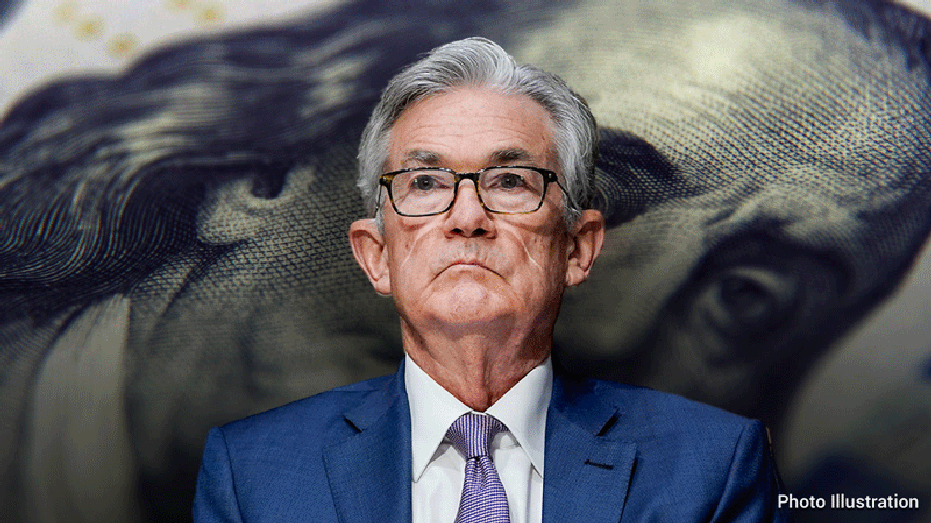ETFs that can benefit from rising interest rates
The Fed hiked rates by 25 basis points and signaled more to come in 2022
Energy ETFs to buy as crude oil surges
CFRA head of ETF and mutual fund research Todd Rosenbluth analyzes the energy sector on 'The Claman Countdown.'
The Federal Reserve has announced a hike to the federal funds rate by a quarter of a percentage point in a move that was widely expected by Wall Street. Policymakers also signaled there will likely be six more increases this year.
The pivot, led by Chairman Jerome Powell, is the first since 2018 and comes in an effort to combat rising inflation. In February, the consumer price index climbed 7.9% on an annual basis, the fastest increase since January 1982.

Federal Reserve Chairman Jerome Powell testifies before the Senate Banking Committee hearing on Capitol Hill on Dec. 1, 2020. (Susan Walsh/Pool via Reuters/File)
FOX Business provides a roundup of ETF opportunities where investors can benefit from rising interest rates.
WHAT DOES A FEDERAL RESERVE INTEREST RATE HIKE MEAN FOR MAIN STREET?
One opportunity that ETFTrends.com CEO Tom Lydon recommends is the SPDR S&P Regional Banking ETF.
SPDR S&P Regional Banking ETF (KRE)
"Regional banks are better positioned than the larger banks to benefit from rising rates as the rates they charge their client lenders rise too," Lydon tells FOX Business. "Most of regional bank revenue comes mostly from lending where larger banks have revenue more diversified into other areas like equity trading and other financial services."
iShares iBoxx High Yield Corporate Bond ETF (HYG)
Lydon also recommends the iShares iBoxx High Yield Corporate Bond ETF.
"With the threat of aggressive rate hikes waning, high yield bonds are instantly more attractive. Many have anticipated multiple rate hikes for 2022 and beyond in an effort to stave off inflation, but Wall Street is less concerned considering recent events," he explains. "There is over $7 trillion in money market accounts and over $15 trillion in bank accounts receiving next to nothing in yield. Smaller and less frequent rate hikes may give these investors confidence to shift some of those funds to higher yielding vehicles."

Torn dollar with ETF message, Exchange Traded Fund stock market concept (iStock)
In addition, Lydon suggests investors consider the Invesco Optimum Yield Diversified Commodity Strategy No K-1 ETF (PDBC), which invests in 14 of the world's most heavily traded commodities, including precious metals, energy and agriculture. PDBC is up about 17% year-to-date.
Invesco Optimum Yield Diversified Commodity Strategy No K-1 ETF (PDBC)
CLICK HERE TO READ MORE ON FOX BUSINESS
FolioBeyond Rising Rates ETF (RISR)
Another ETF option for investors is the FolioBeyond Rising Rates ETF, which invests primarily in interest-only mortgage-backed securities and U.S. Treasury bonds.
"While there can be no guarantee of performance, RISR is engineered to have a duration of negative 10 years," FolioBeyond chief strategist Dean Smith tells FOX Business. "This means that for each 1% increase in rates, RISR is designed to experience an increase in [net asset value] by approximately 10%. To our knowledge, no other ETF has such a direct, measurable exposure to medium-term and long-term rates."
Quadratic Interest Rate Volatility and Inflation Hedge ETF (IVOL)
Smith also suggests the Quadratic Interest Rate Volatility and Inflation Hedge ETF, which invests primarily in Treasury Inflation Protected notes (TIPs).
"IVOL benefits from higher market volatility, but its correlation to interest rate movements is uncertain," Smith says. "Over time, TIPs have had mixed performance as an actual inflation hedge, and they still have positive durations, i.e. they tend to fall in value as interest rates increase. Moreover, IVOL purchases options, for which the fund pays premiums. This tends to reduce the available yield generated by the TIPs holdings."
Horizon Kinetics Inflation Beneficiaries ETF (INFL)
In addition, Smith likes the Horizon Kinetics Inflation Beneficiaries ETF, which invests in companies involved in energy, commodities and financial services.
"It invests in stocks rather than bonds or interest rate hedges, has a meaningful beta exposure to the stock market generally, and may decline in value if higher interest rates contribute to a worsening economic environment that adversely affects the stock market," Smith notes.





















